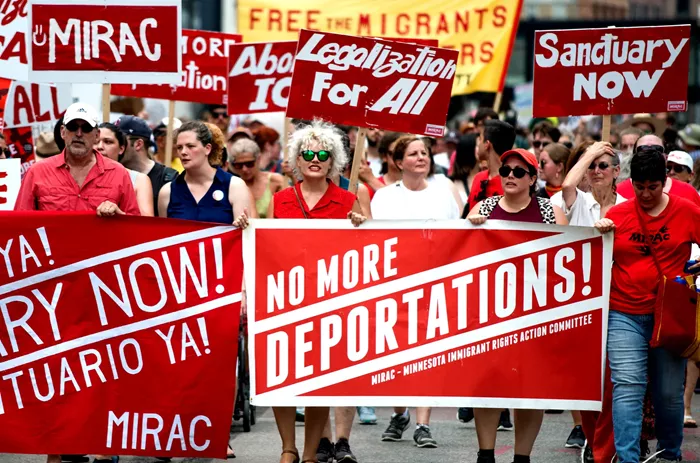Carlos, an undocumented immigrant from El Salvador, moved to California in the mid-2000s to escape gang violence in his home country. He met his future wife in a dance club, and although their relationship began casually, it quickly became serious. Together, they raised a family and built a life in the U.S., despite the constant threat of deportation that loomed over their heads.
Carlos, who is living in the U.S. without legal documentation, recalls the violence he left behind in El Salvador, where gang control was pervasive. “I had several friends who either had to join the gangs or were killed,” he says. I had to leave to survive.” His dream of building a peaceful, opportunity-filled life in America seemed possible, but as political tensions around immigration grew, his family’s future became uncertain.
Under the Trump administration, Carlos and his family feared the worst. They followed every shift in immigration policy, hoping their sanctuary city would offer protection. While they were relieved when President Joe Biden’s victory raised hopes for more favorable immigration policies, those hopes were dashed when a Texas court blocked Biden’s parole program for undocumented people married to U.S. citizens.
With the 2024 election approaching, Carlos is once again fearful for his family’s future. “Trump is talking about mass deportations, and his plans are terrifying,” Carlos says. “He’s waking up the worst in people.”
Trump’s Return to Anti-Immigrant Rhetoric
Donald Trump’s rhetoric against immigrants has intensified as he runs for president again. His campaign has pushed false narratives about immigration and crime, with claims targeting Haitian immigrants in Ohio. At the Republican National Convention, Trump’s supporters held signs calling for “Mass Deportations Now,” as Trump promised to launch the “largest deportation operation” in U.S. history.
Trump’s anti-immigrant stance isn’t new. During his 2016 campaign, he made inflammatory statements about “immigrant rapists” and vowed to build a border wall. His presidency saw attempts to restrict immigration, including a Muslim travel ban, family separations, and mass detentions. While many of his policies were blocked by courts, local governments and immigrant rights advocates managed to slow down his efforts.
But a second Trump term could be more harmful for immigrant communities. Trump has pledged to revive the policies he couldn’t fully implement in his first term, including a border wall, mass deportations, and measures to punish states and localities that refuse to cooperate with federal immigration enforcement.
Legal experts and immigrant advocates warn that Trump’s plans, especially if he is re-elected, could be even more extreme, given his influence over the federal judiciary and his partnership with states like Florida and Texas, which have already deputized local police to enforce federal immigration laws.
Sanctuary Cities and Resistance
In response to Trump’s policies, many cities and states have adopted sanctuary policies that limit cooperation with U.S. Immigration and Customs Enforcement (ICE). This movement gained traction during Trump’s first term, as immigrant rights groups pushed for local law enforcement agencies to refuse ICE detention requests. Despite Trump’s attempts to cut federal funding to these “sanctuary cities,” local governments, particularly in blue states, fought back to protect their immigrant populations.
But the landscape could change dramatically under a second Trump presidency. Advocates say that Trump’s immigration policies will be more difficult to challenge in court due to his judicial appointments. The expansion of conservative judges could lead to rulings that make it harder for immigrant communities to resist deportation efforts.
Mass Deportations: A Growing Threat
Trump has made clear his intention to escalate his deportation efforts, even considering deploying the U.S. military to carry out mass expulsions. He has referenced the Insurrection Act, a 19th-century law that allows the president to send the military to address domestic unrest. Additionally, Trump has suggested using the Alien Enemies Act to target undocumented immigrants from countries with which the U.S. is at war, though the law’s original intent has been widely criticized as outdated and discriminatory.
The potential use of military forces in deportation efforts is alarming. Legal experts note that while the military is trained for combat, it is not equipped to carry out domestic law enforcement operations. However, Trump has expressed confidence that local police forces will cooperate with his plans to round up undocumented immigrants. States like Texas and Florida have already passed laws making it easier for law enforcement to arrest immigrants suspected of crossing the border illegally.
Impact on Immigrant Communities
The threat of mass deportations under Trump’s second term has left many undocumented immigrants in fear for their families and livelihoods. Carlos, who has lived in the U.S. for over a decade, worries about his children’s future. His son, who has developed a passion for aviation, could face separation from his family if Trump’s plans succeed. “Many in the immigrant community don’t have the resources to leave, and if deported, their lives would fall apart,” Carlos says.
Advocates for immigrants warn that deportations would devastate not just individuals and families, but the U.S. economy. Immigrants contribute significantly to the country’s workforce, with estimates showing they pay billions in taxes and contribute to industries ranging from construction to healthcare.
Despite the uncertainty, Carlos remains hopeful that the election results will protect his family. “I believe Kamala will win,” he says, referring to Vice President Kamala Harris, who has positioned herself as tough on immigration while promising to improve the situation for immigrants. “Immigrants are resilient,” says Carlos. “They built the United States.”
As the 2024 election draws nearer, the fate of millions of undocumented immigrants will hinge on the outcome. Whether Trump wins or not, the future of immigration policy and its impact on American families remains a critical issue in the national debate.
Related topics:
- Broken Immigration System Takes Center Stage in Presidential Election
- Arizona Businesses Fear Immigration Ballot Proposal Will Worsen Worker Shortage
- Trump’s Immigration Plan Could Slow Down GDP Growth


